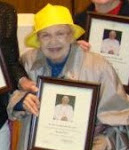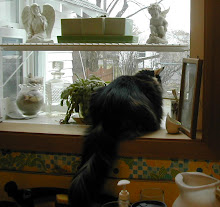I think it was something about her salt and pepper hair that made me think she was severe. She wore it pulled back into a bun at the nape of her neck; no curls, no barrette, no loose strands. She went to our church, but I had never seen her smile nor heard her talk so when Dad informed me that my horses would be spending the summer in the lot behind her house, I was less than enthusiastic. It was up to me to water them daily, which meant I would have to traipse into her yard and use her hose to fill the trough. He might as well have sent me to eat gingerbread off the witch’s house with Hansel and Gretel. Only love for my horses gave me the mettle to go there alone the first day.
For a long time I quietly stood next to the trough, gazing at the hose left like a snake in the grass a whole backyard-length away from the fence. The grey, shingled, neglected old house at the other side of the shaggy lawn taunted me with the faucet that I would have to climb through a barbed wire fence to reach, leaving me vulnerable to her. How could I be sure that she wouldn’t come out and yell at me for trespassing? What would I do? Was she watching, ready to pounce?
Before I dared to move, she was suddenly there beside her house. Worse, she was moving toward me. To my eleven year old mind, she was old, which meant anything over 50, but still independent. She might have been tall and robust at one time, but now was slightly stooped. As soon as our eyes met, she smiled and I quickly learned the adage about not judging a book by its cover. Mrs. F was soft-spoken, kind, and funny and, although I never had much opportunity to talk with her after that day, she continued to teach me volumes from her actions.
As the years marched on, I watched her frame bend until her face was parallel with the floor. Several Sunday mornings Mom and I spotted her walking along the highway, even in the brutal winter, determined to get to church. Usually her son would bring her, but if he failed, she didn’t let it stop her. I remember Mom fussing that she should strike out so, but I think it was just a testament to her faith; she knew she would make it to Mass one way or another. On the days that her son helped her, we would all silently watch as they entered the side door at the front of church, Mrs. F struggling to walk as Mom does now. I think the whole parish collectively held their breath. Her son had his own personal struggles to wrestle in life, but I mentally blessed him every time he brought her in. He, too, will have some stars in his crown.
By the time I was in high school, she was in a wheelchair. Seconds before Mass started, the side door would open and her son would wheel her next to the end of the front pew. Then, after Mass, both of these shy souls would slip back out without a word.
I don’t remember when Mrs. F died; she just seemed to silently slip away. I don’t suppose she ever knew how much she touched my life in her later years without even saying a word. Now, thirty years later, I think of her every day as I watch Mom with some of the same physical struggles; self-conscious about how hard it is for her to walk and worrying that using the walker or wheelchair to get to our pew would make a scene. Then I remind her of Mrs. F and how people felt about her and she quiets.
“Courage doesn’t always roar. Sometimes courage is the quiet voice at the end of the day saying, ‘I will try again tomorrow.’" (Mary Anne Radmacher)
























No comments:
Post a Comment